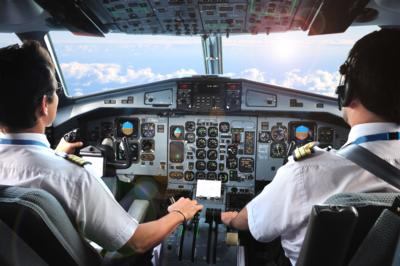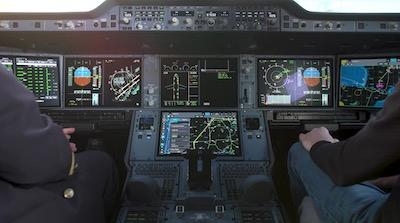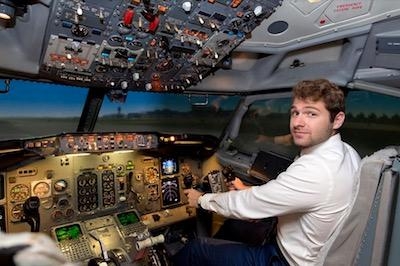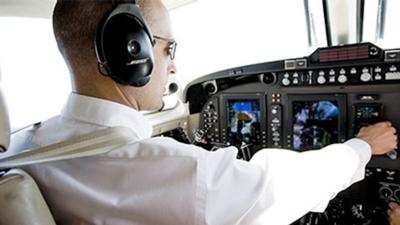Embry-Riddle Professor Looks At Flight Skill Deterioration
When it comes to flying airplanes, the “use it or lose it” rule applies to keeping pilot skills sharp. There has been no greater time in recent history, however, when pilots lacked a chance to “use it” than during the Covid-19 pandemic, when airlines halted or greatly reduced their services. This stretch of time, according to an Embry-Riddle Aeronautical University researcher, had an alarming impact on pilot proficiency.

“What surprised me was the level of skills deterioration over such a short duration,” said the study’s principal investigator, adjunct professor Dr. Rajee Olaganathan, citing a 50% increase in pilot errors following the pandemic-related shutdown of summer 2020. “Skill knowledge is acquired slowly through related experience and practice. When flying hours are reduced, it will have an effect on the pilots' skills.”
The highest reduction in global flight operations during the pandemic occurred in May 2020, when services reduced 70.6% compared to the level of service one year prior. In the United States alone, that translated to a total of 532,834 fewer flights than in May 2019.
“The current Covid-19 scenario made it difficult for pilots to achieve federal requirements,” Olaganathan said. “It also placed a burden on pilots to maintain their currency and proficiency, due to lack of access to aircraft following industry-wide furloughs and layoffs. Because of that, the number of safety incidents related to pilot proficiency increased tremendously during this pandemic period.”

Olaganathan published her findings in the Global Journal of Engineering and Technology Advances earlier this year, and standing as one of the main problem areas identified in the study was a pilot’s skill at landing. In one such case, 97 people died in a Pakistan Airlines crash deemed to be caused by “human error.”
In order to maintain safety certifications, pilots are required to perform at least three takeoffs and landings per 90-day period, but due to shutdowns, that was impossible for many. This has led to some airlines practicing work-sharing: a schedule in which flights are assigned evenly among all on-staff pilots to ensure equal practice opportunities.
“Challenges will no doubt emerge as the airline industry readies for takeoff again,” Olaganathan said — but the key, to her, is proactivity. “Airlines have to develop training programs, webinars for pilots re-entering services ranging from theory refreshers to multiple simulator sessions, as well as supervised in-flight checks, depending on the length of absence.”
Governing bodies like the FAA, she added, could also approve virtual proficiency standards — for example, line checks conducted in simulators rather than physical aircraft — to offer pilots an alternative method to stay up to date on various certifications, in spite of travel restrictions, cost or any other physical restraint.
“Pilots also need to make an honest assessment of their skills and confidence upon returning to work,” she said. “They may need to turn down offers like shorter landing approaches from air traffic control, if they do not feel ready.”

Assisting in the research was alumnus Roli Angelo H. Amihan (’21), a former master of Aeronautical Science student and military serviceman.
“Having served in the aviation side of the military in the Philippine Navy, I have seen colleagues and friends injured and die from something that could have been prevented had there been a proactive mindset in terms of aviation safety,” he said. “I wanted to do something meaningful that would be useful to the aerospace industry.”
That drive is what drew him to Embry-Riddle, as well as to Olaganathan’s research project, which he believes will ultimately make him a more desirable hire to future employers.
“The work helped me to be more self-aware of my capabilities, especially if I haven’t flown for a long time,” he said. “It made me a more safety-minded pilot, which I can bring into my aviation career.”

Next, the San Tan Valley native hopes to work as a certified flight instructor, eventually becoming a missionary pilot.
“Igniting research at the undergraduate and graduate levels is one of my passions,” Olaganathan said, adding that she is currently planning follow-up projects to this study, to further understand the issue and get additional students involved.
A professor in the College of Aeronautics at Embry-Riddle’s Worldwide Campus, Olaganathan is also the cofounder and director of multiple avionics sales and services firms in Asia, she is a fellow member of the Royal Aeronautical Society and serves on the editorial board for six peer-reviewed journals. The value of her research was reinforced by College of Aeronautics Dean Ken Witcher. “Research projects like these offer students great opportunities to dive into industry data before entering the field as employees,” he said.
 ANN's Daily Aero-Term (12.01.25): Convective SIGMET
ANN's Daily Aero-Term (12.01.25): Convective SIGMET ANN's Daily Aero-Linx (12.01.25)
ANN's Daily Aero-Linx (12.01.25) NTSB Final Report: Remos Aircraft GmbH Remos GX
NTSB Final Report: Remos Aircraft GmbH Remos GX Aero-News: Quote of the Day (12.02.25)
Aero-News: Quote of the Day (12.02.25) ANN's Daily Aero-Term (12.02.25): Coupled Approach
ANN's Daily Aero-Term (12.02.25): Coupled Approach






